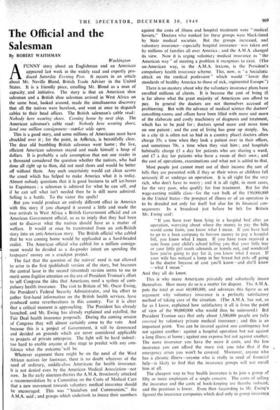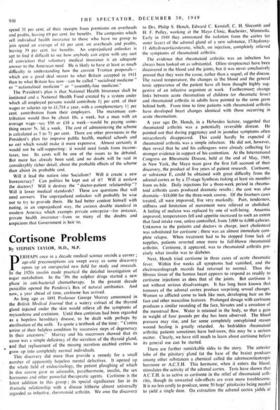The Official and the Salesman
By ROBERT WAITHMAN Washington
AFUNNY story about an Englishman and an American appeared last week in the widely read and expertly pro- duced Saturday Evening Post. It occurs in an article about Mr. Neville Blond, British Trade Adviser in the United States. It is a friendly piece, extolling Mr. Blond as a man of capacity. and initiative. The story is that an American shoe salesman and a British shoe salesman arrived in West Africa on the same boat, looked around, made the simultaneous discovery that all the natives were barefoot, and went at once to dispatch cables to their head offices. The British salesman's cable read: Nobody here wearing shoes. Coming home by next ship. The American salesman's cable read: Nobody here wearing shoes. Send one million consignment—market wide open.
This is a good story, and some millions of Americans must have chuckled over it ; for the point, in AiMerica, is beautifully clear. The dear old bumbling British salesman went home ; the live, efficient American salesman stayed and made himself a heap of dollars. It is probably a safe assumption that not one reader in a thousand considered the question whether the natives, who had done all right up to then, did not need shoes and would be better off without them. Any such uncertainty would cut clean across the creed which has helped to make America what it is today. Almost nobody questions that it is good business to sell ice-boxes to Esquimaux ; a salesman is admired for what he can sell, and if he can sell what isn't needed then he is still more admired. Selling is a battle. To the victor the spoils!
But you would produce an entirely different effect in America with this story if you changed it around a little and made the two arrivals in West Africa a British Government official and an American Government official, so as to imply that they had been sent to discover what the natives should have as a matter of welfare. It would at once be transmuted from an anti-British story into an anti-American story. The British official who cabled that he was coming home would be applauded as a hard-headed realist. The American official who cabled for a million consign- ment would be derided as a do-gooder intent on spending the taxpayers' money on a crackpot project.
The fact that the question of the natives' need is not allowed to arise in the first (published) version of the story, but becomes the central issue in the second (invented) version seems to me to merit some fugitive attention on the eve of President Truman's effort to 'sell Congress the idea that Americans need a system of com- pulsory health insurance. The visit to Britain of Mr. Oscar Ewing, the President's Federal Security Administrator, and his effort to gather first-hand information on the British health services, have produced some reverberations in this country. For it is clear that a critical moment is approaching. The President has already launched, and Mr. Ewing has already explained and extolled, the Fair Deal health insurance proposals. During the coming session of Congress they will almost certainly come to the vote. And because this is a project of Government, it will be denounced and derided on grounds which are never considered applicable to projects of private enterprise. The fight will be hard indeed: too hard to enable anyone at this stage to predict with any con- fidence what the outcome 'will be.
Whatever argument there might be on the need of the West African natives for footwear, there is no doubt whatever of the need of ordinary, middle-class Americans for health insurance. It is not denied even by the American Medical Association—not now. In the early nineteen-thirties the A.M.A. ferociously attacked a recommendation by a Committee on the Costs of Medical Care that a new movement towards voluntary medical insurance should be encouraged. This was "Socialism and Communism," the A.M.A. said ; and groups which undertook to insure their members against the costs of illness and hospital treatment were " medical Soviets." Doctors who worked for these groups were black-listed by State medical societies. But the groups increased, and voluntary insurance—especially hospital insurance—was taken out by millions of families all over America ; and the A.M.A. changed its view. Now it is urging voluntary medical insurance as " the American way " of meeting a problem it recognises to exist. (The un-American way, in the A.M.A. lexicon, is the President's compulsory health insurance scheme. This, now, is " a Socialistic attack on the medical profession " which would " lower the standards of healthy America to those of sick, regimented Europe.")
There is no mystery about why the voluntary insurance plans have enrolled millions of clients. It is because the cost of being ill is far above what the great majority of Americans can afford to pay. In general the doctors are not themselves accused of profiteering. But with the advance of medical science the doctors' consulting-rooms and offices have been filled with more and more of the elaborate and costly machinery of diagnosis and treatment, which has to be paid for ; doctors spend more and more time on one patient ; and the cost of living has gone up steeply. So, in a city (it is often not so bad in a country place) doctors often charge 35s. a time when they look a patient over in their offices, and sometimes 70s. a time when they visit him ; and hospitals habitually charge £3 a day for patients who are sharing a ward, and £7 a day for patients who have a room of their own ; and the cost of operations, examinations and what not is added to that.
Most people just cannot meet out of their income the sort of bills they are presented with if they or their wives or children fall seriously ill or undergo an operation. It is all right for the very rich, who don't have to worry ; and it is all right, in most cases, for the very poor, who qualify for free treatment. But for the wage-earning middle class—for the vast bulk of the 150,000,000 in the United States—the prospect of illness or of an operation is to be dreaded not only for itself but also for its financial con- sequences. In a broadcast just before he left for Britain Mr. Ewing said: " If you have ever been lying in a hospital bed after an operation, worrying about where the money to pay the bills would come from, you know what I mean. If you have had to go to a loan company to borrow money to pay a hospital bill, you know what I mean. If you have even received a note from your child's school telling you that your little boy or your little girl needs adenoids or tonsils out, and wondered how you're going to pay for it, you know what 1 mean. It your wife has noticed a lump in her breast but puts off going to the doctor because of cost you'll know—and she'll know —what I mean."
And they all do know.
This is why many Americans privately and voluntarily insure themselves. How many do so is a matter for dispute. The A.M.A. puts the total at over 60,000,000, and advances this figure as an argument why voluntary insurance is a perfectly satisfactory method of taking care of the situation. (The A.M.A. has not, so far as I know, explained how satisfactory it all is from the point of view of the 90,000,000 who would thus be uninsured.) But President Truman says that only about 3,500,000 people are fully covered by voluntary private medical insurance ; and this is an important point. You can be insured against one contingency but not against another: against a hospital operation but not against a long illness at home ; against one expense but not against another. The more insurance you have the more it costs, and the less insurance you can afford the more risk you take that if the emergency arises you won't be covered. Moreover, anyone who has a chronic illness—anyone who is really in need of financial help—is likely to find that the insurance groups will not enroll him at all.
The cheapest way to buy health insurance is to join a group of fifty or more employees of a single concern. The costs of selling the insurance and the costs of book-keeping are thereby reduced, and the premium is lower. Even then (according to Mr. Ewing's figures) the insurance companies which deal only in group insurance spend 31 per cent. of their receipts from premiums on overheads and profits, leaving 69 per cent. for benefits. The companies which sell individual health insurance to those who have no group to join spend an average of 61 per cent. on overheads and profits, leaving 39 per cent. for benefits. An unprejudiced onlooker is apt to find it difficult to sec how anybody can argue with any sort of conviction that voluntary medical insurance is an adequate answer to the American need. He is likely to have at least as much difficulty in understanding how the current Truman proposals— which are a good deal nearer to what Britain accepted in 1911 than to what Britain has now—can be called " socialised medicine " or " nationalised medicine - or " assembly-line medicine."
The President's plan is that National Health Insurance shall be instituted and a National Health Fund created by a system under which all employed persons would contribute l4 per cent. of their wages or salaries up to £1,714 a year, with a complementary 1 3 per cent. contribution from their employers. The maximum con- tribution would thus be about 10s. a week, but a man with an average wage—say S50 or £18 a week—would be paying some- thing nearer 5s. 3d. a week. The cost of administering the scheme is calculated as 5 to 74 per cent. There are other provisions in the President's plan (to improve public health, medical schools and so on) which would make it more expensive. Almost certainly it would not be self-supporting: it would need funds from income- taxes, too. Its costs will be one of the issues to be debated.
But more has already been said, and no doubt be said in considerably richer detail, about the probable effects of the scheme than about its probable cost.
Will it lead the nation into Socialism? Will it create a new bureaucracy? Can politics be kept out of it? Will it enslave the doctors? Will it destroy the " doctor-patient relationship "? Will it lower medical standards? These are questions that will need answers. The unprejudiced onlooker will probably be wise not to try to provide them. He had better content himself with noting, in an unprejudiced way, the curious double standard in modern America which exempts private enterprise—for instance, private health insurance—from so many of the doubts and suspicions that Government is heir to.































 Previous page
Previous page